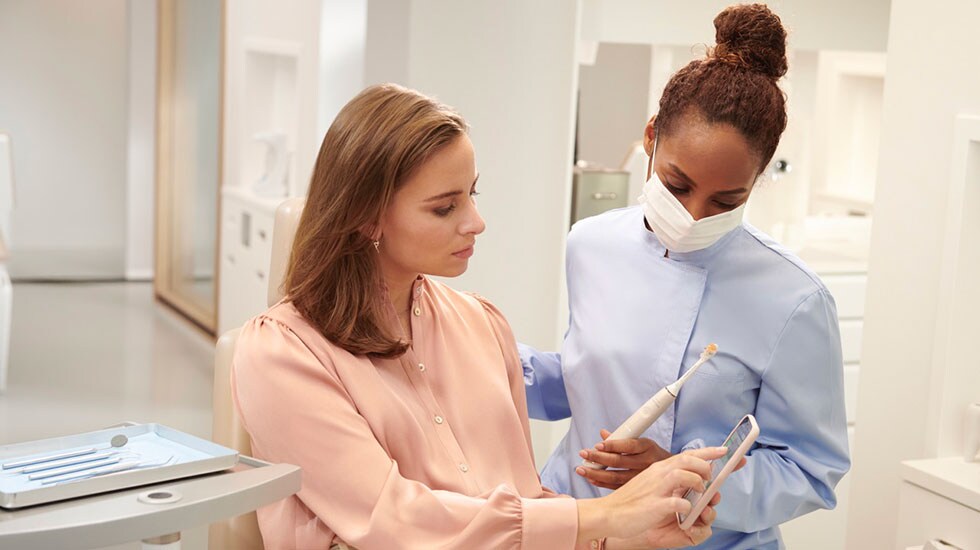New World Economic Forum report reveals depth of global oral disease crisis
Jul 25, 2024 | 4 minute read
Ongoing global neglect of oral health investment has triggered a significant health crisis, impacting the daily lives of almost half of the world’s population. [1] Economic Rationale for a Global Commitment to Invest in Oral Health, published in May 2024 by the World Economic Forum (WEF), details how addressing the oral health crisis can improve overall health outcomes and economic growth.

As a global leader in health technology and member of the World Economic Forum Oral Health Affinity Group with over 30 years of expertise in oral care, Philips played an advisory role to the report, which was the first industry-wide white paper delivered by the group.
This report underlines the need for continued improvements in accessing oral care and the importance of doing so to promote systemic health.
“This report underlines the need for continued improvements in accessing oral care and the importance of doing so to promote systemic health. The oral health crisis disproportionately impacts underserved communities; by putting oral health in the spotlight, the Oral Health Affinity Group calls for vital public-private partnerships to bridge the global oral health equity gap,” said Francesco Grillo, SVP and Global Business Leader, Oral Healthcare Business Unit, Philips.
The scale of the crisis
Oral disease, including periodontal disease, dental caries, tooth loss, and oral cancer, affects approximately 3.5 billion people each year – and cases are growing faster than the global population. [1, 2] The report builds on the 2022 World Health Organization (WHO) landmark global strategy on oral health, which recognized the severe consequences of untreated oral conditions on families, communities, and the wider healthcare system. [3]
Oral disease impacts the most vulnerable communities
Global treatment costs and productivity losses from oral disease are estimated to cost over $710 billion each year – an economic penalty that disproportionately impacts the world’s most vulnerable populations. [2] Despite increasing recognition of oral health’s importance, access to oral healthcare remains restricted by cost for individuals in addition to a lack of resource to invest in oral health infrastructure. [2]
Prevention is key to improving health outcomes
The report highlights a need to switch focus from treatment to the prevention of oral disease by improving oral health literacy globally. Oral diseases are largely preventable and require only simple intervention to treat if caught early. [2] By developing educational strategies to assist clinicians with patients’ oral health, Philips is helping to meet oral health literacy needs.
Addressing oral health has been linked to reducing medical care costs and improving the health outcomes of pregnant people and people suffering from cardiovascular disease, respiratory disease, dementia, and arthritis. [2] Philips is focusing its oral health expertise on enabling oral health equity worldwide, contributing to its overall goal of improving 2.5 billion lives per year by 2030, including 400 million in underserved communities. The global achievement of oral health equity would also advance the United Nations’ health-related Sustainable Development Goals.
We are proud to be working with a broad community of oral health advocates, including Philips, through the World Economic Forum’s Oral Health Affinity Group.
Colgate-Palmolive is a key partner in the Oral Health Affinity Group: “As a worldwide leader in oral care, Colgate-Palmolive is committed to deepening its support for initiatives that address the global oral health crisis, said Dr. Maria Ryan, Executive Vice President and Chief Clinical Officer of Colgate-Palmolive. “We are proud to be working with a broad community of oral health advocates, including Philips, through the World Economic Forum’s Oral Health Affinity Group as we continue to explore new ways to address oral health inequities and combat low oral health literacy through various initiatives and partnerships. Our goal is to increase knowledge around critical preventative oral care and to inspire good habits.”
Investing in access to oral care
Building public-private collaborative partnerships and financing oral health solutions is key to accelerating oral health investment. [2] To support bridging the oral care equity gap and to champion oral health activities, Philips continues to partner with civil organizations such as the Oral Health Foundation and establish partnerships with dental insurance companies.
As demonstrated in Thailand and Brazil, which have integrated oral health into their universal healthcare systems, investment in oral health literacy and preventive strategies can significantly improve oral health equity when coupled with adequate healthcare financing.
Philips is dedicated to engaging in strategic cooperation with foundations, governments, academic institutions, professional organizations, and advocacy groups to build further momentum in oral health advocacy and address the global health crisis.
The Oral Health Affinity Group was launched by the World Economic Forum in 2023, to shine a light on the impact of poor oral health on health outcomes and the global economy, and the actions that governments and the private sector can take to advance oral health globally. The group sits within the Global Health Equity Network, a group of over fifty companies committed to advancing health equity.
Sources [1] World Health Organization, "Global oral health status report," World Health Organization, 2022.
[2] World Economic Forum in collaboration with the American Dental Association, Colgate-Palmolive Company and Henry Schein, "The Economic Rationale for a Global Commitment to Invest in Oral Health," World Economic Forum, 2024.
[3] World Health Organization, "Landmark global strategy on oral health adopted at World Health Assembly 75," World Health Organisation, 28 May 2022. [Online]. Available: https://www.who.int/news-room/feature-stories/detail/landmark-global-strategy-on-oral-health-adopted-at-world-health-assembly-75. [Accessed May 2024].







